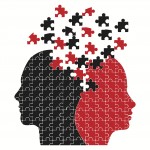
We know very little about how to increase the safety and wellbeing of mothers who experience intimate partner violence. A good deal of the research in this field focuses on treatments delivered by health professionals, but this cluster randomised trial from Melbourne Australia looked at the impact that non-professional mentor support can have in reducing intimate partner violence and depression in pregnant and recent mothers experiencing, or at risk of violence.
The trial was based in 106 primary care clinics. Sixty-three of the participating clinics referred 215 eligible culturally and linguistically diverse women between January 2006 and December 2007:
- 113 received the intervention (standard clinical care plus 12 months of weekly home visiting from trained and supervised local mothers, offering non-professional befriending, advocacy, parenting support and referrals)
- 61 received the comparison treatment (standard clinical care)
- 133 (76.4%) women (90 in the intervention group and 43 in the comparison group) completed follow-up at 12 months
The main outcomes were intimate partner violence measured by the Composite Abuse Scale and depression measured by the Edinburgh Postnatal Depression Scale. Secondary measures included wellbeing (SF-36), parenting stress (PSI-SF) and social support (MOS-SF) at baseline and follow-up. An intention-to-treat analysis was conducted using multivariable logistic regression and propensity scoring. The researchers justified this approach by saying:
Due to an imbalance in the numbers of women recruited in the two arms of the trial, a propensity score (PS) analysis was also undertaken to balance the arms for potential confounding from possible selection bias.
Clinicians and researchers were not blinded to the treatments given as the mentoring intervention was part of standard primary care. The researchers recognised that this was a weakness in their methodology.
The results showed:
- A difference in mean abuse scores at follow-up comparing the intervention and comparison groups (15.9 vs 21.8, AdjDiff -8.67, CI -16.2 to -1.15)
- Proportions of women with Composite Abuse Scale scores ≥ 7, 51/88 (58.4%) vs 27/42 (64.3%) AdjOR 0.47, CI 0.21 to 1.05)
- Proportions of women with Edinburgh Postnatal Depression Scale scores ≥ 13, (19/85, 22% vs 14/43, 33%; AdjOR 0.42, CI 0.17 to 1.06)
- Physical wellbeing mean scores (PCS-SF36: AdjDiff 2.79; CI -0.40 to 5.99)
- Mental wellbeing mean scores (MCS-SF36: AdjDiff 2.26; CI -1.48 to 6.00)
- There was no observed effect on parenting stress
- 82% of women mentored would recommend mentors to friends in similar situations
The research team concluded:
Non-professional mentor mother support appears promising for improving safety and enhancing physical and mental wellbeing among mothers experiencing intimate partner violence referred from primary care.
Links
Taft AJ, Small R, Hegarty KL, Watson LF, Gold L, Lumley JA. Mothers’ AdvocateS In the Community (MOSAIC)–non-professional mentor support to reduce intimate partner violence and depression in mothers: a cluster randomised trial in primary care. BMC Public Health. 2011 Mar 23;11:178.
Ramsay J, Carter Y, Davidson L, Dunne D, Eldridge S, Hegarty K, Rivas C, Taft A, Warburton A, Feder G. Advocacy interventions to reduce or eliminate violence and promote the physical and psychosocial well-being of women who experience intimate partner abuse. Cochrane Database of Systematic Reviews 2009, Issue 3. Art. No.: CD005043. DOI: 10.1002/14651858.CD005043.pub2.
